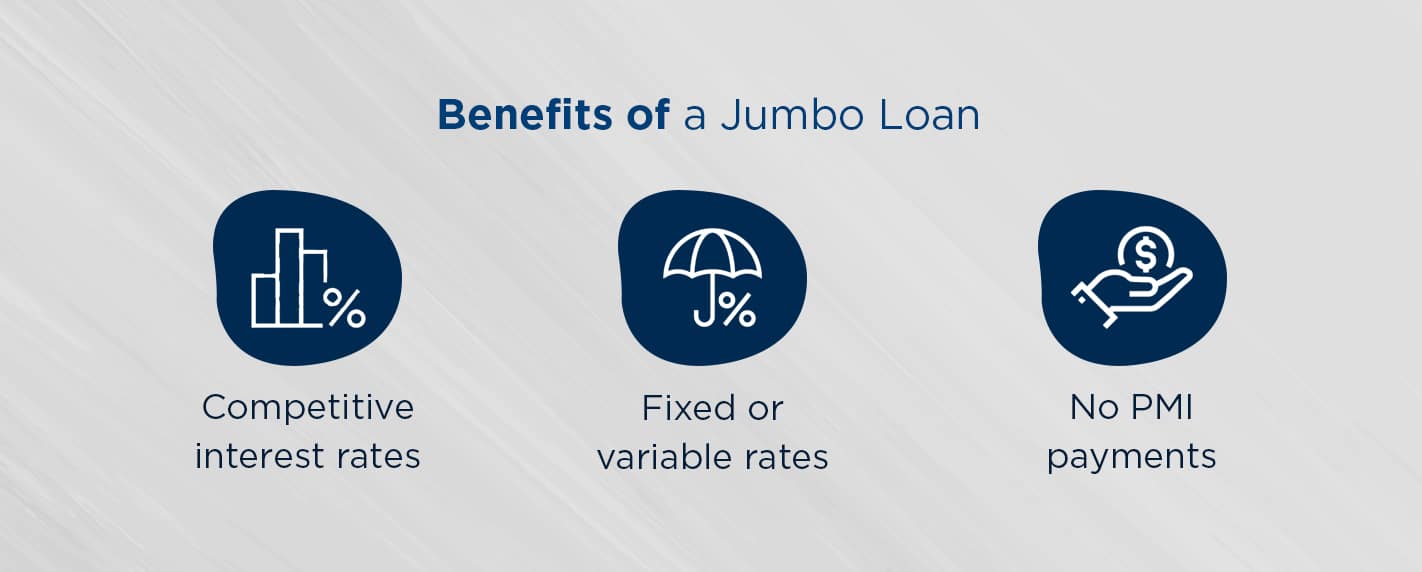Jumbo Loan: Financing Solutions for Houses Above Conforming Purviews
Jumbo Loan: Financing Solutions for Houses Above Conforming Purviews
Blog Article
The Impact of Jumbo Finances on Your Financing Alternatives: What You Need to Know Prior To Applying
Jumbo lendings can play a critical duty in forming your funding alternatives, particularly when it comes to obtaining high-value residential properties. Understanding the equilibrium in between the difficulties and advantages postured by these financings is necessary for potential debtors.
Understanding Jumbo Lendings
Comprehending Jumbo Loans calls for a clear grasp of their distinct characteristics and demands. Big fundings are a sort of home loan that goes beyond the adapting car loan restrictions established by the Federal Real Estate Finance Company (FHFA) These restrictions vary by location yet commonly cap at $647,200 in the majority of areas, making big financings crucial for funding higher-priced residential properties.
Among the specifying attributes of jumbo finances is that they are not eligible for purchase by Fannie Mae or Freddie Mac, which leads to more stringent underwriting guidelines. Debtors must typically show a greater debt score, typically above 700, and give considerable documentation of earnings and possessions. Additionally, loan providers may call for a bigger down repayment-- usually 20% or even more-- to minimize risk.
Rate of interest on jumbo loans can be somewhat greater than those for adhering finances due to the increased threat assumed by the loan provider. The lack of private home loan insurance policy (PMI) can balance out some of these expenses. Comprehending these variables is critical for prospective debtors, as they dramatically affect the terms and feasibility of protecting a big financing in today's affordable realty market.
Benefits of Jumbo Financings
Jumbo car loans supply distinctive benefits for homebuyers seeking to acquire high-value residential properties that exceed conventional car loan limitations. Among the main advantages of jumbo financings is their ability to finance larger amounts, enabling buyers to get homes in premium markets without the constraints enforced by adapting financing restrictions - jumbo loan. This adaptability makes it possible for property buyers to see a broader variety of residential or commercial properties that might better fit their demands and preferences
In addition, big lendings commonly include affordable rates of interest, especially for consumers with solid credit rating profiles. This can lead to substantial cost savings over the life of the financing, making homeownership extra budget friendly in the future. Furthermore, big lendings can be customized to suit private financial circumstances, offering different terms and amortization choices that straighten with the consumer's goals.

Challenges of Jumbo Loans
Navigating the complexities of big lendings offers a number of obstacles that prospective customers need to understand before continuing. One considerable hurdle is the rigid financing criteria enforced by financial institutions. Unlike adjusting financings, jumbo finances are not backed by government-sponsored enterprises, leading loan providers to embrace even more rigorous standards. This frequently includes higher credit history demands and substantial documentation to confirm revenue and properties (jumbo loan).
Additionally, big car loans usually come with greater rate of interest compared to traditional financings. home This elevated cost can dramatically influence month-to-month settlements and overall affordability, making it essential for debtors to meticulously examine their economic circumstance. The down settlement requirements for big lendings can be significant, typically varying from 10% to 20% or more, which can be an obstacle for numerous potential house owners.
An additional obstacle exists in the limited accessibility of jumbo funding items, as not all lending institutions offer them. This can lead to a reduced pool of options, making it important for consumers to carry out thorough study and possibly seek specialized lending institutions. On the whole, understanding these difficulties is important for anyone considering a big lending, as it guarantees educated decision-making and far better economic planning.
Qualification Standards
For those considering a big lending, fulfilling the credentials standards is a crucial action in the application process. Unlike standard lendings, jumbo lendings are not backed by government companies, causing stricter demands.
First of all, a solid credit score is crucial; most lending institutions call for a minimal rating of 700. In addition, consumers are typically anticipated to show a considerable revenue to ensure they can pleasantly take care of greater month-to-month payments.
Deposit requirements for jumbo finances are likewise significant. Debtors ought to expect placing down a minimum of 20% of the residential property's acquisition price, although some loan providers might provide choices as reduced as 10%. Showing money gets is vital; loan providers frequently need proof of adequate liquid properties to cover a number of months' worth of home mortgage repayments.
Comparing Funding Alternatives
When reviewing financing alternatives for high-value homes, recognizing the distinctions in between different car loan types is essential. Jumbo car loans, which exceed conforming car loan limitations, typically featured stricter qualifications and greater rate of interest prices than traditional fundings. These car loans are not backed by government-sponsored business, which increases the loan provider's threat and can lead to extra stringent underwriting standards.
On the other hand, traditional financings supply even more flexibility and are often simpler to obtain for debtors with strong credit scores profiles. They may feature lower rate of interest rates and a broader selection of alternatives, such as dealt with or variable-rate mortgages. Additionally, government-backed loans, like FHA or VA car loans, give possibilities for reduced deposits and more forgiving credit history demands, though they likewise enforce limits on the loan quantities.

Verdict
In conclusion, big lendings present both chances and difficulties for prospective buyers looking for funding for high-value buildings. While these finances permit larger quantities without the worry of personal home loan insurance coverage, they include rigorous qualification requirements and potential disadvantages such as greater rate of interest prices. An extensive understanding of the advantages Learn More and challenges connected with big financings is necessary for making educated decisions that line up with long-term monetary goals and purposes in the property market.

Report this page